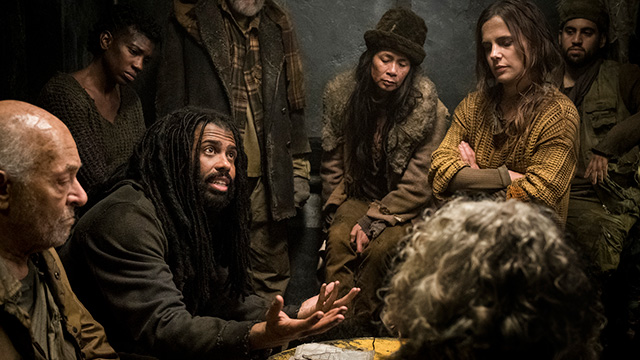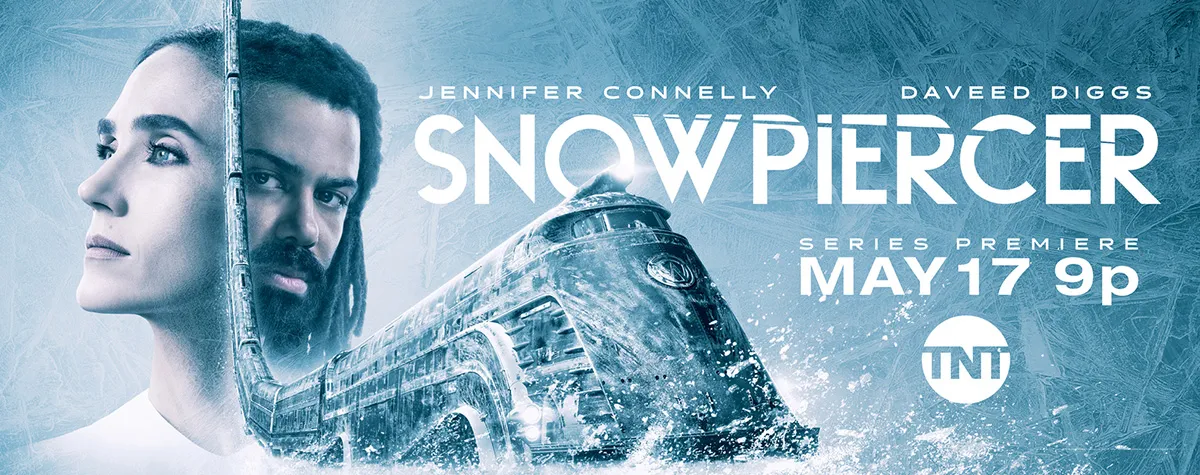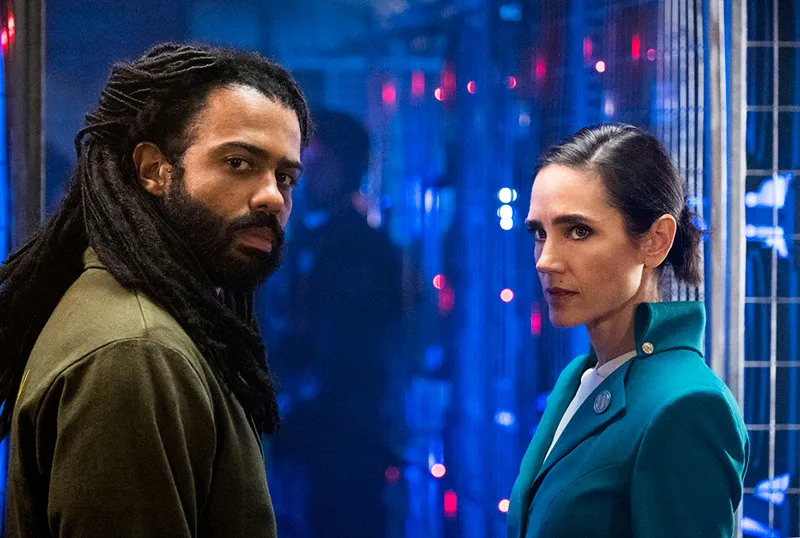Snowpiercer is an ideal story to adapt into a television series with so much to flesh out about people living on a speeding train, consisting of 1,001 cars each with their own distinct purposes and identities, like a bunch of tiny worlds gathered together in a whittled down universe traveling through a post-apocalyptic reality that is controlled by strict, horrifying class systems. While the TNT series, driven by a phenomenal cast, does spend ample time exploring many of the different cars and the planet’s soul survivors trapped together on the locomotive, Snowpiercer hits a few bumpy roads along the way.
RELATED: New Snowpiercer Trailer: Order Must Be Restored
Created by Graeme Manson and based on Bong Joon Ho’s critically acclaimed movie starring Chris Evans as well as the graphic novel series that inspired it all by Jacques Lob, Jean-Marc Rochette, Benjamin Legrand, and Olivier Bouquet, the new series centers on Snowpiercer, the Great Ark Train, which has kept the last remnants of humanity alive for almost seven years. A rigid class system maintains order, with First Class holding power over workers, while a condemned Prison Class struggles to survive in the Tail. Now, a grisly murder is stoking class division, so Melanie Cavill (Jennifer Connelly), the powerful head of hospitality, deputizes a dangerous rebel to help solve the killing — Andre Layton (Daveed Diggs), the world’s only surviving homicide detective.
Viewers can jump in without having seen the 2013 film as the show kicks off with the basic background info you need, helped along with a very cool animation turned live-action sequence that propels you right into the action. I would still highly recommend watching the movie first, though, not as a means to compare the two projects (especially as the movie is on a very different level) but simply as a foundation for what to expect from the show and it’s very fast-paced storytelling. The series adopted that pace from the movie (though not quite as successfully) and kept some of the “crazier” elements, but the show is largely toned down compared to the original. The best example would be contrasting Tilda Swinton’s bonkers character from the movie, Mason, to Ruth Wardle, played by Alison Wright, a similar role that is a watered-down version of the fanatical loyalist who only wants to please Mr. Wilford, the “unseen” antagonist of the story who serves as the mastermind behind the train and its operations.
In order to explore the world of Snowpiercer, the writers came up with an interesting idea to introduce a serial killer on board the Great Ark, one that might carry a few secrets Mr. Wilford would rather not be revealed to the remaining citizens. The murders threaten “Wilford’s precious order,” and in a desperate move, the so-called invisible leader’s right-hand Melanie drags Layton out of the Tail section and demands he track down the killer. Layton agrees while making a few initial demands of his own, including “Third Class calories, space, and reproductive rights for the Tail” — which should give you some idea how terribly the Tail section is treated. Unbeknownst to anyone outside of the Tail, though, Layton, a revolutionary to the core, mostly agrees to solve the murders in an effort to gather information as he investigates as many cars as possible and meets a variety of new people, waiting for the day his people can take the engine.

Every episode begins with a different character narrating, offering unique perspectives as the series works hard to humanize some of the people outside of the Tail section. But how can anyone justify what has been done to the Tailies, as they’re referred to on the show, and the conditions they’ve been forced to live in? How aware are the other groups of their suffering outside of what they’ve been told for nearly seven years, and how much does that matter to people who are also trapped? Some of the characters, particularly Melanie, genuinely believe in a balance, one that is based on keeping people in “their place” in order for the survival of what’s left of the human race and their fragile ecosystem to continue on. In one scene, Melanie says, “I see 3,000 souls surviving, thanks to order, meticulously maintained by Mr. Wilford. A balance of need and greed and speed and you Tailies seem to have forgotten how the planet is frozen over and Mr. Wilford is awake 21 hours a day just to keep the goddamn heat on.” When spoken to about stability, though, Layton points out that the higher class cars have “killers and cannibals up here,” telling them not to lecture him about balance: “My people found ours years ago.”
Some characters struggle with the morality of their decisions while others don’t, but many commit unthinkable acts in the name of their own definition of the greater good, thus bringing up discussions of right and wrong and what it really means to do terrible things for the “right reasons” if those reasons are highly subjective and come at a very, very high cost. Class warfare, social injustice, and the politics of survival stay front and center of the series as it attempts to ground the narrative in its characters as they push the story along, building anticipation for a reckoning on the horizon. Josie Wellstead (Katie McGuinness), Layton’s comrade in arms, reminds the viewers early on: “The more they steal from us, the more human we become. Humanity will fill our bellies one day when we eat the rich of Snowpiercer, 1,001 cars long.”
Like the film, messages of inequality, class systems, morality, desperation, fear, survival, love, revolution, righteous anger, and violence are all touched on in the series, though not nearly as significantly as in the movie, which is why I think it’s important viewers who have seen the film don’t try to compare the show to its feature predecessor, but to instead enjoy it as its own vision. The film is far more ingeniously subtle, darker, heavier, chaotic, bloodier, and shocking, and carries a far bigger impact than the show does. That’s not to say that the series doesn’t draw out those crucial themes that are layered within the structure of the story, but the movie itself is simply untouchable even by its own small-screen adaptation.
RELATED: CS Review: Defending Jacob Is a Worthwhile Psychological Family Drama
The series sometimes falters in its pace, jolting you out of the narrative at times which itself is not always on point, but it does come with genuinely surprising twists, fascinating characters, and original scenes as it explores what life might be like on a 1,001 car speeding train housing the only living things left on earth. Despite navigating a bit of a rough patch in a few episodes where it struggles to maintain its footing, Snowpiercer is, overall, a worthwhile journey.
Snowpiercer will premiere on TNT on Sunday, May 17 at 9:00 p.m. ET/PT.
Snowpiercer (TNT)
-
Snowpiercer











